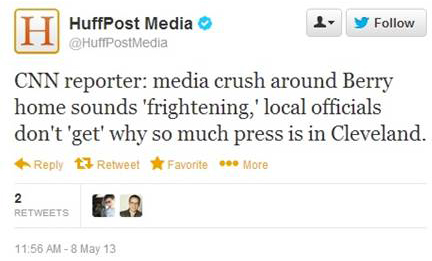I try not to overthink anything I see on Twitter. I find only 140 characters leave plenty of room for misinterpretation. That said, I was struck by a tweet last week from the Huffington Post. Citing a CNN reporter, @HuffPostMedia tweeted: "media crush around Berry home sounds 'frightening,' local officials don't 'get' why so much press is in Cleveland." Since I was not there, I can't vouch for the accuracy of the statement, which referred to the hundreds of reporters outside the home of Amanda Berry, one of the young women rescued last week. But it got me to thinking about major media events.
Since I was not there, I can't vouch for the accuracy of the statement, which referred to the hundreds of reporters outside the home of Amanda Berry, one of the young women rescued last week. But it got me to thinking about major media events.
I was shocked that anyone would be surprised by the media attention. When I produced cable news we had a saying about good stories: they needed four elements: mystery, outrage, drama and video. The Cleveland kidnappings have plenty of all four.
In the world of news there are two types of events, the planned (the Olympics, a major trial, presidential elections) and breaking news (extreme weather, unthinkable crime, and yes, unexpected miracles). Both draw a media crowd that can feel a bit like the cicadas that are about to start swarming the south.
For the record, this year's cicada invasion is a planned media event as we know they will appear every 17 years. But even with close to two decades to prepare, when the global media descends on any type of community, be it a town, city or organization it can be very overwhelming. I've experienced the international press corps from both sides. And even in the best of circumstances when an event has been planned for months or even years, "controlled chaos" is about all you can hope for.
I was recently involved in several large media events here in Boston and have come away with six key takeaways.
Track Inquiries and Coverage: Keep a spreadsheet of every request you get with the reporter's inquiry and contact information and take the extra time to monitor the coverage. By keeping track of what reporters are asking and reporting you will be able to determine what information they need to tell the story accurately.
Anticipate Media Needs: The media is very predictable during breaking news. Reporters will want to get close to the action, they will speculate often with "experts" or anyone close to the action who is willing to talk, and in a 24 hour news cycle they will be focus on any new information they can get. The best thing you can do when big news hits: start thinking like a reporter. Gather the background materials they will need, make sure there is enough space to park media vehicles before calling a press conference, and know their deadlines so you can try to work around them. By being a source rather than a roadblock you will build relationships and credibility.
Don't Play Favorites: You may have friends in the media or you might be tempted to "stick it" to a reporter who has written negative articles in the past, but a major media event is not the time to play favorites. Make sure everyone has access to the same information at the same time. When you're responding to hundreds of inquiries it's a time saver to send out one media advisory.
Be Available 24/7: Sorry 9 to 5ers, you can't stay on top of a story just during business hours. Make sure the media has access to a credible spokesperson and media facilitator at all times.
Release Your Own Media: By releasing your own pictures and video as well as participating in the social media conversations you ensure that your part of the story gets told. This is also a great may to build trust with reporters. If the media knows that you will provide them with compelling content they are going to anticipate it and run it.
Identify Spokespeople Ahead of time and Use Them: Every organization needs to have people ready to speak with the media. Take time to train them and make sure they are looped in as situations unfold. Remember that during breaking news, anyone willing to talk can end up being an unofficial spokesperson, so don't hold back and start participating in the conversation.
Getting back to the Huffington Post tweet, I did a little investigating and found the source in a CNN transcript from May 8. Reporter Martin Savidge is quoted "And that's part of the story here is that when you talk to local officials, they don't get it as far as how much media is here or why. The reason we know why is it is so rare… in these circumstances of missing people, not one, three of them, walk out of this horrible circumstance alive. And that is remarkable, and I think news that the world wants. It's no wonder {the community is} being overwhelmed."
Remarkable indeed but not unpredictable, I'm sure that newsrooms already have their recipes for cicada pesto ready to go.
* * *
Kellyanne Dignan is associate VP and director of training at Rasky Baerlein Strategic Communications, Boston.


 AB InBev has hired Donna Lorenson as chief communications officer and elevated the PR function to the senior leadership structure in the aftermath of the Bud Light marketing disaster.
AB InBev has hired Donna Lorenson as chief communications officer and elevated the PR function to the senior leadership structure in the aftermath of the Bud Light marketing disaster. Tunheim handled the Minnesota USA World Expo bid committee, which on June 21 congratulated Serbia for landing the 2027 event.
Tunheim handled the Minnesota USA World Expo bid committee, which on June 21 congratulated Serbia for landing the 2027 event. United Minds, management consultancy, has launched Myriant, a business resiliency offering to help clients deal with the challenges during this era of misinformation, polarization and geopolitical upheaval.
United Minds, management consultancy, has launched Myriant, a business resiliency offering to help clients deal with the challenges during this era of misinformation, polarization and geopolitical upheaval.  ImageShield, which guards against online image abuse, is looking for a communications pro to handle its PR and marketing campaigns.
ImageShield, which guards against online image abuse, is looking for a communications pro to handle its PR and marketing campaigns. Who knew that there is a real paper company, Pennsylvania Paper & Supply, inside the iconic building seen at the opening of every episode of “The Office?”
Who knew that there is a real paper company, Pennsylvania Paper & Supply, inside the iconic building seen at the opening of every episode of “The Office?” 


 Have a comment? Send it to
Have a comment? Send it to 
No comments have been submitted for this story yet.